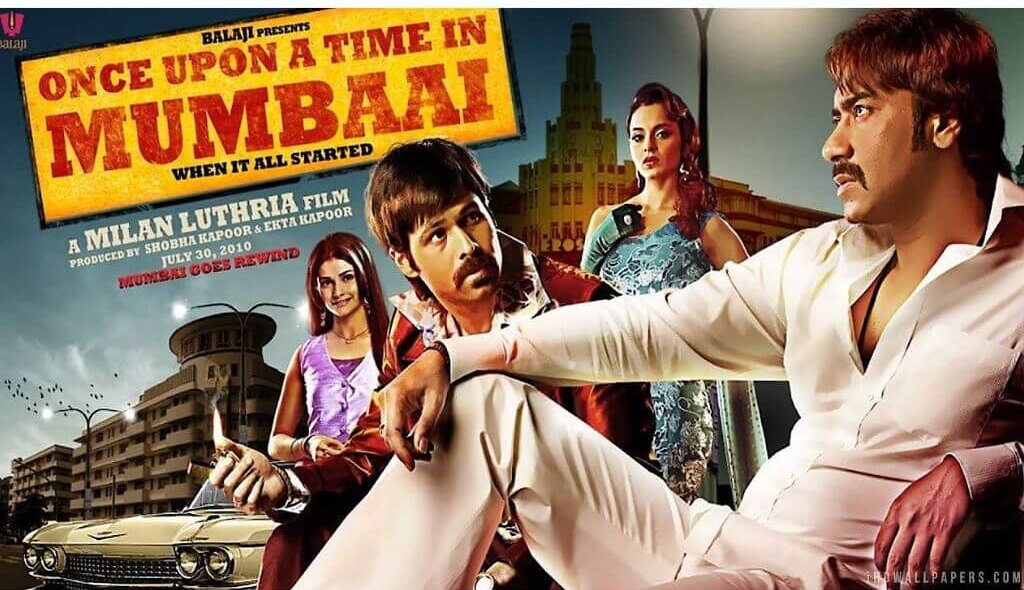Even if we haven’t noticed, we’ve seen them—the long-running trend of titling a Bollywood film with some English language flavor. You know what we mean: Jab We Met, 3 Idiots, Once Upon A Time In Mumbai, Goa Goa Gone, and more. What’s the reasoning behind this trend of Hinglish-influenced film titles? Our contributor, Tushar Unadkat, cracks the filmi code.
[About the contributor: Internationally celebrated, award-winning media personality and author of several lifestyle articles, Tushar Unadkat, is the CEO, Creative Director of MUKTA Advertising, Founder, and Executive Director of Nouveau iDEA, Canada. He holds a Master of Design from the University of Dundee, Scotland, and BA Honors in Photography from the University of Wolverhampton, England.]
The term “Bollywood” is commonly used to refer to the Hindi-language film industry based in Mumbai, India. While the term is widely recognized and used internationally, it can evoke mixed feelings among Indians.
On one hand, Bollywood has become a globally recognized brand, and many Indians take pride in the success and popularity of Indian cinema on the international stage. The term itself is a portmanteau of Bombay (the former name for Mumbai) and Hollywood, reflecting the influence of the Western film industry on the Indian film industry.
On the other hand, some people within India’s film industry and cultural circles feel that the term “Bollywood” can be reductive and oversimplify the diversity of Indian cinema. It tends to be associated primarily with mainstream Hindi-language films, often overlooking the rich and varied regional film industries in different parts of the country. Critics argue that the term reinforces a narrow and stereotypical view of Indian cinema.
This backdrop sets the stage for the evolving trends in Bollywood, particularly the significant transformation in the titling of its movies marked by a surge in Hindi films adopting English titles.

Examples of English-named Hindi Movies:
Numerous films have contributed to this evolving trend, featuring titles such as “Three of Us,” “3 Idiots,” “Gaslight,” “No One Killed Jessica,” “Once Upon a Time in Mumbai,” “Action Replayy,” “Knock Out,” “Go, Goa, Gone,” and more. And then there is, of course, the latest Oscar-winning film, RRR. These titles stand out in the expansive realm of Hindi cinema, with their English names raising eyebrows and inviting speculation.
Cultural Implications:
Various factors contribute to the shift to English names in Hindi movies, with global appeal leading the way. As Bollywood extends beyond Indian borders, filmmakers opt for English titles to make their films more accessible to a diverse international audience. English titles serve as a strategic marketing tool, facilitating engagement and understanding for non-Hindi speakers.
Moreover, the use of English names in Hindi movies may reflect the growing cosmopolitan nature of Indian society. With the younger generation exposed to global influences and English-language media, filmmakers choose titles that resonate with this demographic, adding a modern and sophisticated flair to the films and attracting a broader spectrum of viewers.
Creative Freedom And Innovation:
Filmmakers exercise their creative freedom by experimenting with titles. English names offer a broader canvas for expressing the essence of the movie, enabling filmmakers to play with words and create titles that capture attention and curiosity. This shift signifies a departure from conventional norms, ushering in a new era of innovation in Bollywood.

Adapting To Changing Tastes:
Adopting English names in Hindi films could also be a response to changing audience preferences. Filmmakers may choose titles aligning with contemporary sensibilities as viewers’ tastes evolve, perceiving English names as trendier and more in sync with the globalized, fast-paced world.
The trend of English-named Hindi movies has generated varied responses among older generations and severe fans of Indian cinema. For some, there’s nostalgia for the traditional Hindi titles that defined Bollywood, and the shift to English may be seen as a departure from cultural identity and authenticity, potentially creating a communication gap for those less comfortable with English.
Resistance to change is expected, with concerns about the industry moving away from its roots. However, some older enthusiasts appreciate the artistic freedom and innovation behind English titles, acknowledging the industry’s evolution. Others emphasize the importance of storytelling over the language of the title.
Global Market Penetration:
In addition to the previously highlighted factors, the adoption of English names in Hindi films plays a pivotal role in enhancing the global appeal of Bollywood, particularly in non-South Asian markets, notably in the Western regions. As the distribution of Bollywood movies expands across well-established cinema chains like Cineplex Odeons and AMC theatres, alongside the growing prevalence of OTT platforms utilizing English titles and subtitles, this linguistic transition emerges as a strategic imperative. It serves as a vital tool for captivating the interest of a diverse and international audience, facilitating the broader and more effective penetration of Bollywood content into global entertainment markets.
English titles facilitate the accessibility of Bollywood films for non-South Asian viewers, making them more inclined to experience these cinematic offerings in cinemas abroad. The global audience, often unfamiliar with Hindi language nuances, finds English titles more approachable, contributing to the growing popularity of Bollywood in international markets.
This trend aligns with the industry’s proactive approach to cater to a broader spectrum of moviegoers, transcending cultural and linguistic barriers. The presence of English-named Hindi movies in Western cinema chains not only enhances the visibility of Bollywood but also fosters a sense of inclusivity, inviting a broader audience to partake in the rich tapestry of Indian cinema.

Conclusion:
The rise of English-named Hindi movies represents a dynamic shift in Bollywood’s landscape. While some purists may argue for preserving traditional Hindi titles, the industry’s embrace of English names reflects the ever-changing nature of cinema. Filmmakers, driven by a desire to connect with a global audience and cater to shifting tastes, are exploring new avenues in creativity and expression. As the debate continues, one thing is sure – the trend of English-named Hindi movies is here to stay, challenging conventions and contributing to the dynamic evolution of Bollywood on an international scale.
This article was first published in Anokhi Life.
Subscribe to Nouveau iDEA.





